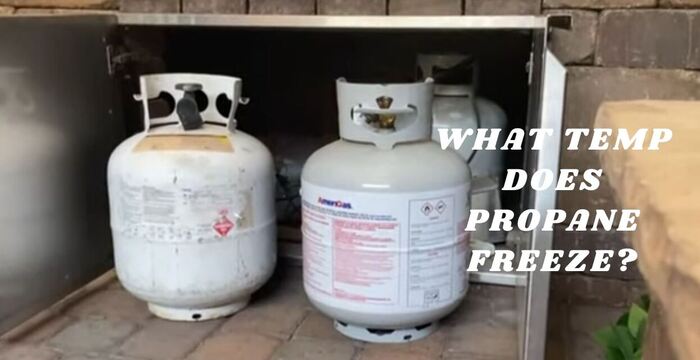Introduction
Unveiling the Mystery: At what temp does propane freeze? is an informative piece that delves into the scientific aspects of propane, a commonly used fuel in our daily lives. It explores the specific temperature at which propane transitions from a gas or liquid state into a solid, a fact that is crucial for its storage and transportation. This article aims to demystify the physical properties of propane, providing a comprehensive understanding of its behavior under varying temperature conditions.
What Temp Does Propane Freeze?
Propane, a hydrocarbon gas that is widely used as a fuel source in various applications, has some intriguing properties that are not commonly known. One of these properties is its freezing point, a topic that has sparked curiosity among many. Unveiling the mystery, we delve into the question: at what temp does propane freeze?
Propane, like other gases, can transition from one state of matter to another under certain conditions. It can exist as a gas, a liquid, or a solid, depending on the temperature and pressure. However, the freezing point of propane is not as straightforward as it might seem. It is not simply a matter of lowering the temperature until the gas solidifies.
Why Homeowners Should Care About Propane Freezing
Propane, a versatile and efficient fuel source, is widely used in homes for heating, cooking, and powering appliances. Despite its widespread use, many homeowners are unaware of the conditions under which propane can freeze, and why this is a matter of concern. Unveiling this mystery, propane, in its usual liquid form, freezes at a temperature of -306.4 degrees Fahrenheit or -188 degrees Celsius. This is a temperature far below what we would typically experience, even in the coldest of winters. However, the freezing point is not the only temperature-related concern for propane users.
The more pressing issue is the vaporization of propane, which occurs at temperatures above -44 degrees Fahrenheit or -42 degrees Celsius.
Factors Affecting Propane Freezing
Propane, a hydrocarbon gas that is widely used as a fuel source in various applications, has a unique set of properties that make it an ideal choice for heating, cooking, and other uses. One of the most intriguing aspects of propane is its freezing point, a characteristic that is influenced by a variety of factors. Unveiling the mystery of at what temperature propane freezes involves delving into the realm of chemistry and physics, and understanding the conditions that affect its state of matter.
To begin with, it is important to note that propane, like all gases, does not freeze in the conventional sense. Instead, it undergoes a process known as condensation, where it transitions from a gas to a liquid state.
Tips for Managing Propane in Cold Weather

Propane, a versatile and commonly used fuel, is known for its efficiency and reliability. However, as the winter months approach, many propane users may wonder about the impact of cold weather on their propane supply. Specifically, at what temp does propane freeze? Unveiling this mystery is crucial for managing propane in cold weather and ensuring a steady supply of this essential fuel.
Propane, a liquefied petroleum gas, remains in a liquid state under pressure within a tank. It only becomes a gas when it is released from the tank. The freezing point of propane, or the temperature at which it transitions from a liquid to a solid, is a staggering -306.4 degrees Fahrenheit (-188 degrees Celsius). This temperature is far below any temperature experienced.
How Can I Prevent My Propane Tank from Freezing?
Propane, a versatile and commonly used fuel, is a staple in many households and industries. It powers everything from grills and heaters to forklifts and generators. However, as with any fuel, it’s essential to understand its properties and how to handle it safely. One of the most frequently asked questions about propane is, “At what temperature does propane freeze?” The answer to this question is crucial, especially for those living in colder climates, as it can significantly impact the performance and safety of propane-powered appliances.
Propane, in its natural state, is a gas. However, for storage and transportation purposes, it is often compressed into a liquid. This liquid propane can withstand a wide range of temperatures, but it does have its limits.
What to Do if Your Propane Freezes
Unveiling the mystery of propane’s freezing point is a fascinating exploration into the realm of physical chemistry. Propane, a hydrocarbon gas used widely for heating and cooking, is a substance that behaves in intriguing ways under varying temperature conditions. It is crucial to understand these behaviors, especially for those who rely on propane for their daily needs.
Propane, under standard atmospheric conditions, remains in a gaseous state. However, when subjected to extremely low temperatures, it can transition into a liquid or even a solid state. The freezing point of propane, the temperature at which it transitions from a liquid to a solid, is a bone-chilling -306.4 degrees Fahrenheit (-188 degrees Celsius).
When to Call a Professional
If your propane tank seems frozen, it’s important to stay safe. While propane itself doesn’t freeze until -306°F, the tank’s pressure can drop in very cold weather, making it hard for propane to flow. If this happens, don’t try to fix it yourself. Call a professional right away to check your tank and equipment.
They’ll ensure everything is working properly and safely. Remember, it’s better to be safe than sorry when dealing with propane. Always consult an expert if you’re unsure about your propane system.
Q&A
1. Question: At what temperature does propane freeze?
Answer: Propane freezes or becomes a solid at a temperature of -306.4 degrees Fahrenheit or -188 degrees Celsius.
2. Question: Is propane usually in a gas or liquid state?
Answer: Under normal atmospheric conditions, propane is usually in a gas state. However, when compressed under moderate pressure, it can become a liquid.
3. Question: Can propane be used in cold climates?
Answer: Yes, propane can be used in cold

Leave a Reply